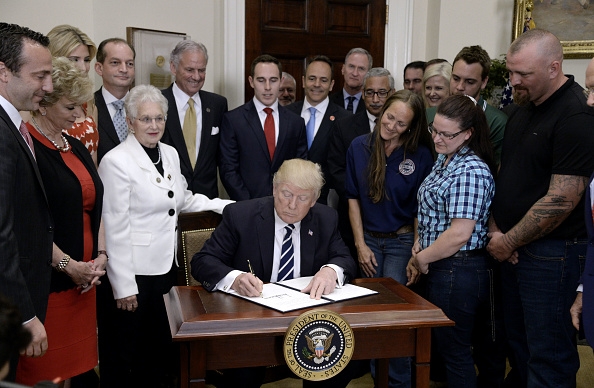You have /5 articles left.
Sign up for a free account or log in.

President Trump, Representative Virginia Foxx (in white) and others at executive order signing event
Getty
President Trump on Thursday signed an executive order that seeks to expand apprenticeships, in part by opening the door to alternative education providers and giving industry groups a more active role with the federal apprenticeship program.
“Apprenticeships place students into great jobs without the crippling debt of traditional four-year college degrees,” Trump said at the White House event. “Instead, apprentices earn while they learn.”
The administration did not mention any new money Thursday, but sources said it plans to announce an allocation of up to $200 million, which would be more than double the $90 million for apprenticeships in this year’s federal budget.
The White House has said it wants growth industries that historically have not focused much on apprenticeships, including health care, IT and manufacturing, to expand their offerings.
As expected, the executive order calls for the creation of a federal task force to help promote apprenticeships. Among other goals, the committee has been tasked with how best to bring industry into the quality-control and oversight side of federally recognized apprenticeships, which have a required educational component and typically last more than two years.
“We will be removing federal restrictions that have prevented many different industries from creating apprenticeship programs,” Trump said at the Thursday event. “So we're empowering these companies, these unions, industry groups, federal agencies to go out and create new apprenticeships for millions of our citizens.”
Roughly 505,000 people work in federally registered apprenticeships. Employers must apply to participate in the program, and many say the registration process is needlessly cumbersome. In addition, they receive little or no federal subsidies for their apprenticeship programs. As a result, critics say the process has helped keep employer participation relatively light -- just 0.3 percent of the work force are apprentices.
However, the federal program also includes a range of standards designed to ensure the quality of the work and learning experience, in addition to protecting apprentices. The rules include wage requirements and minimum time at work sites and on the related learning side, which occurs at community colleges, four-year institutions or at unaccredited education providers such as labor unions and industry associations.
The new executive order encourages federal agencies to help nongovernmental and noncollege organizations create apprenticeship programs that could be fast-tracked for federal registration status.
“These third parties may include trade and industry groups, companies, nonprofit organizations, unions, and joint labor-management organizations,” the order said.
While a broad range of experts and industry groups praised the administration’s focus on apprenticeships, some worried about opening up the federal process to outside players.
“What is the purpose of this alternative system? It’s not clear that they’re solving any problems with it,” said Mary Alice McCarthy, director of the Center on Education and Skills with the education policy program at New America and a former official at the U.S. Education and Labor Departments. “Apprenticeship has some very clear standards. That’s why it works so well.”
McCarthy said possible problems with relaxing and outsourcing federal standards for apprenticeships include confusion, fragmentation and potentially registering programs that are too short term or that fail to yield portable credentials. Likewise, U.S. Representative Bobby Scott of Virginia, who is the top Democrat on the House education committee, said in a written statement that the order fails to "maintain necessary quality controls and accountability requirements."
Business groups welcomed the administration’s move, however. The U.S. Chamber of Commerce in a written statement applauded the White House for “offering solutions that bring the business community to the table.”
The Business Roundtable had a similar message.
“Work-and-learn models, including internships and apprenticeships, are powerful tools to close the skills gap and meet our nation’s work force needs. We support the president’s challenge and look forward to partnering with government at every level as we work together to rebuild the pipeline that generates top talent,” Wes Bush, the chairman, CEO and President of Northrop Grumman Corporation and chair of the Business Roundtable’s Education and Workforce Committee, said in a written statement.
The National Skills Coalition said it appreciates that the executive order includes a public comment period on new regulations from the Labor Department that relate to the apprenticeship push.
“NSC hopes to work with the administration to make sure the new system offers the protections and transparency necessary to ensure that new apprentices will receive the necessary wage gains and industry certifications that will put them on a path to a family-supporting career,” Andy Van Kleunen, the coalition’s CEO, said in a written statement.
The Trump administration has taken plenty of heat from congressional Democrats and others, including a few Republicans, by calling for deep cuts to federal job-training programs while also seeking to expand apprenticeships.
“It cannot be ignored that the president’s proposed 2018 budget slashed funding to the Workforce Innovation and Opportunity Act, to the Carl D. Perkins Career and Technical Education Act, and to adult education,” Van Kleunen said. “These federal programs have strong bipartisan support in Congress and are being reformed to be more responsive to the needs of business through local industry partnerships.”
Yet Trump’s executive order appeared to defend that philosophy: “Finally, federally funded education and work force development programs that do not work must be improved or eliminated so that taxpayer dollars can be channeled to more effective uses.”








